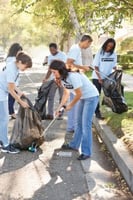Introduction The world has become increasingly digital, and non-profit organizations are no...
What Your Community Needs to Know About Litter
What Your Community Needs to Know About Litter
Litter is Dangerous
The community you live in may not have a concern about litter, but it is a serious problem worldwide. While most individuals say they do not leave litter on the ground or in the water, a recent survey revealed that approximately 75 percent of them have tossed trash outside at least once in the last five years. Unfortunately, one of the most common items tossed on the ground is cigarette butts that can contaminate water and soil in addition to starting a fire. Litter is dangerous because tossed trash degrades to leach chemicals into ground soil and water systems. But wait, there's more...
Floating Garbage IslandsYou might think that people would respect the ocean because it is a beautiful ecosystem, but researchers estimate that nine billion tons of trash is dumped in oceans each year. The trash that doesn't dissolve is trapped in ocean currents and collects in certain locations referred to as garbage patches. These patches are changing oceans drastically, leading to injuries for marine life and destroying marine plants. The submerged patches or floating garbage islands also cause problems for boats.
Trash Enters Waterways
Despite many towns and cities having laws against littering in public places such as highways and parks, most individuals continue to dump trash rather than bag it securely for collection. There are geographic regions that enforce littering laws by issuing citations or financial fines, but people continue to throw soft drink cans or fast-food wrappers on the ground instead of finding a trash can. Litter left on the ground is unsightly and washes into storm water systems before traveling to major waterways such as rivers.
Vehicle Tire Dumping
Scientists believe that trash such as plastic, Styrofoam and glass will not degrade for a million years, and trash that does dissolve leaves dangerous chemicals in the water and soil. The trash that begins to degrade is known as sludge and is considered toxic and hazardous waste. Small items such as beverage bottles, cardboard boxes and food cans are not the only waste left in public places as litter because vehicle tires are frequently found on beaches.
Educate the Public





